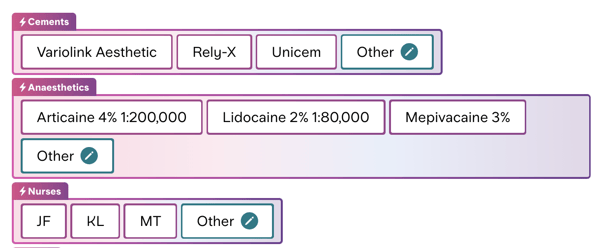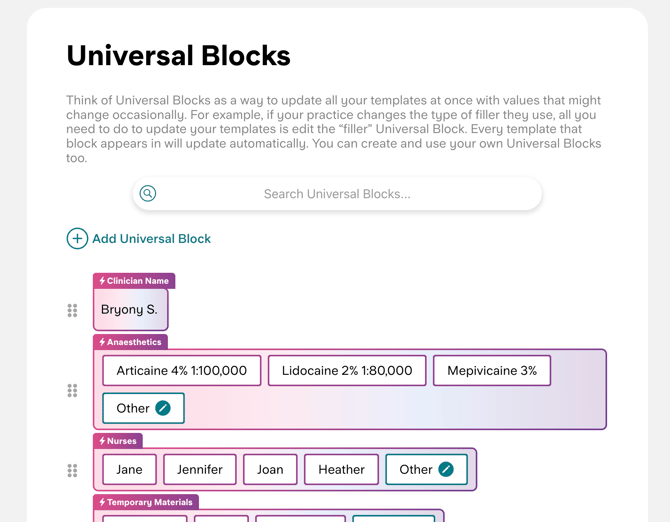Creating and managing Universal Blocks
A centralised bank of blocks to use across all Note templates - update once, use anywhere!
What are Universal Blocks?
Universal Blocks are a specific kind of building block that apply across all of your templates.
If you make changes to the Universal Block, it will update that Universal Block wherever it is in use. This means you need to make fewer changes to individual templates.
For instance - You add a new nurse's name to your 'Nurse' universal block, and this will update in every template this block is used.
Universal Blocks can be text fields or buttons.
Some examples of useful universal blocks include:
- Nurse or assistant names
- Medication batch numbers and expiry date
- Anaesthetics used
- Labs used by the practice
- The chief complaint or treatment options
- Time frames e.g. seconds, minutes, hours

Using Universal Blocks
You can access all of your Universal Blocks from 'Tweak Templates' then 'Universal Blocks' in your sidebar.
From here you can search for, create new, edit/amend or delete existing Universal Blocks.

Add Universal Blocks from the Template Editor
You also have the option to add Universal Blocks to your templates from the sidebar in the Template Editor. That means you can create all of your Universal Blocks in one go, and then go through your templates to replace normal blocks with any new Universal Blocks.
.gif?width=670&height=351&name=ScreenRecording2025-04-03at4.30.39PM-ezgif.com-video-to-gif-converter%20(1).gif)
⚡️ All Universal Blocks have a lightning symbol next to their name.
Managing Universal Blocks
Universal Blocks can be created from scratch from the Universal Blocks page. You can also convert an existing block into a Universal Block from within a template, in the Template Editor.
Create from the Universal Blocks page
Create a new universal block by clicking the 'Add Universal Block' option at the bottom.
This will open up a panel on the right-hand side. From here, you can create your Universal Block. You'll need to give it a name, choose the type of block and add relevant options.
Convert an existing block into a Universal Block
Hover over the block and select the 'More Options' dots in the top right corner, then select, 'Convert into Universal Block'

You will need to give your Universal Block a name before saving it. You can also make any other edits.
Your block will now appear as a Universal Block, ready to be reused!
Changing Universal Blocks
Universal Blocks can either be changed from the sidebar page or from within the template editor.
From the Universal Block page
From here you can open an existing Universal Block and edit it. You can rename it, change the type of block, delete or add new options or delete your Universal Block entirely.
For instance, you can update your 'Nurse' block to add another new name, and remove another.
💡 At the moment you cannot delete the 'My Nurse' Universal Block which we create for you, based on any nurse names in your settings page.
From the Template Editor
Click to change a Universal Block type or add new options.
.gif?width=670&height=351&name=ScreenRecording2025-04-03at4.30.39PM-ezgif.com-video-to-gif-converter%20(1).gif)
If you choose 'Unlink Universal Block' it turns the block into a regular button and any changes made to this block will only apply to that specific template. The Universal Block will not be affected.

You will need to confirm this before unlinking the Universal Block.
This could be of use if the changes you make are only relevant in the context of that specific template. Alternatively, you could also create two Universal Blocks, each with different options.
Universal Blocks FAQs
Can Universal Blocks be shared?
If you share a template with a Universal Block this block will convert to a standard block on the recipient's account. They may then want to convert this to use as a universal block on their account, or substitute in their own universal block of the same type i.e. substitute their 'Nurse' block for yours.
Will links carry across templates where I change a Universal Block?
Links are specific to the template they are built in. That means that if you change a normal block into a universal block, you will still need to create the relevant linked lines.
For example, I built a new option into one of my Universal Blocks in Template A.
Template B, which also uses this Universal Block, is immediately updated to now include this new option.
If the purpose of the new Universal Block option is to create new lines, you will need to create the link between this new Universal Block option and the relevant output line in both Template A and Template B.

